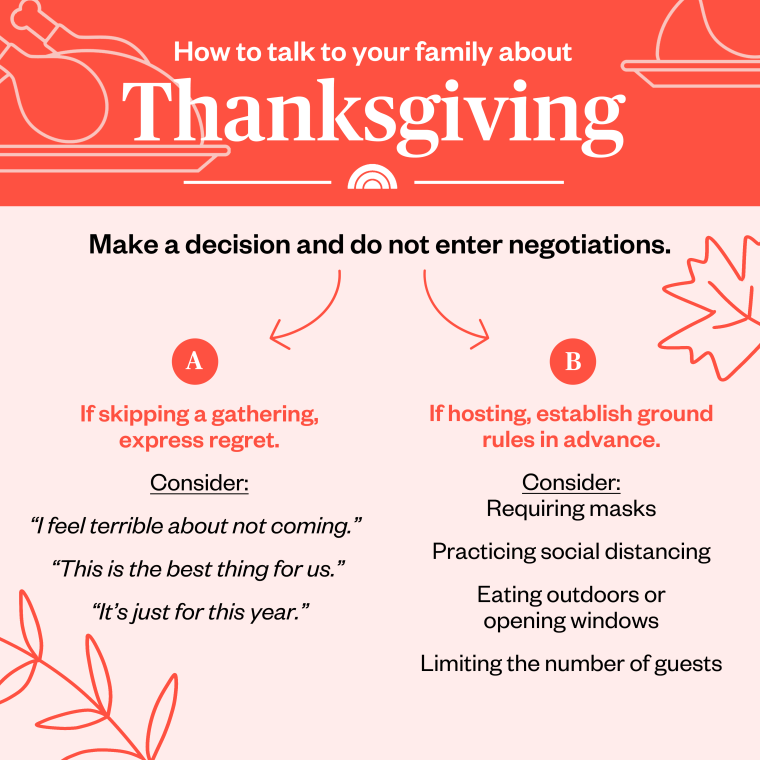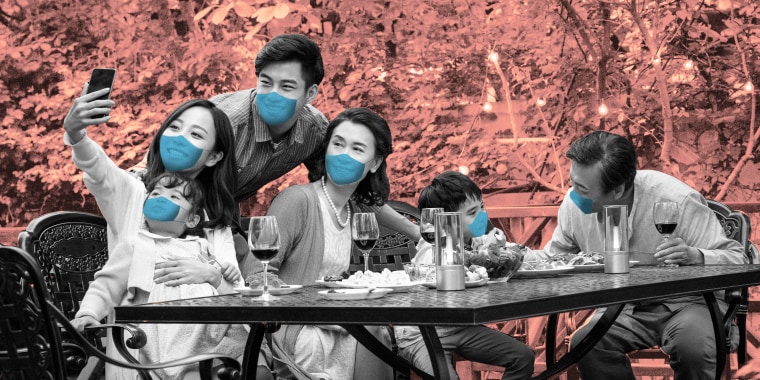The coronavirus continues to spread through much of the U.S. — setting new case records as most Americans are beginning to plan their Thanksgiving celebrations.
While the virus is certainly not invited to any Thanksgiving dinners, in much of the country there's a good chance it could show up. If you're struggling to come up with a plan for your family, know that you are not alone. To help answer some common questions, TODAY spoke to more than a dozen epidemiologists and infectious disease experts to figure out how they're staying safe while still celebrating the holiday.
Household members-only gathering
1. Dr. Anthony Fauci, director of the National Institute of Allergy and Infectious Diseases, Washington, D.C.
“My Thanksgiving is going to look very different this year,” Fauci said in an interview with CBS News. “I would love to have it with my children, but my children are in three separate states throughout the country and in order for them to get here, they would all have to go to an airport, get on a plane and travel with public transportation.”
“They themselves, because of their concern for me and my age, have decided they’re not going to come home for Thanksgiving, even though all three of them want very much to come home for Thanksgiving,” he said.
2. Suzet McKinney, Ph.D., CEO of the Illinois Medical District in Chicago and an adjunct instructor at Harvard University’s T.H. Chan School of Public Health
“I have a college-aged daughter who will be returning home one week before Thanksgiving and it will just be the two of us,” McKinney said, noting that her daughter will be quarantining at college before making the 12-hour drive home. “My mom is of advanced age and will want to see my daughter so we’ve arranged for a socially distant visit, with masks, outdoors. If we can’t be outside, we might cancel it.”
3. Dr. Diego Hijano, an infectious disease doctor at St. Jude Children’s Research Hospital in Memphis, Tennessee
“I will be celebrating with my wife and two daughters (who are in elementary and middle school),” said Hijano. “We are not planning on having anyone over or visiting any family … People are tired of doing Zoom or Webex or Google Hangouts, but that’s really the safest way to connect.”
4. Dr. Corey Casper, CEO of the Infectious Disease Research Institute in Seattle, Washington
“Personally, my family has decided to pass on a large gathering this year with extended family members. Instead, I’ll be celebrating at home with members of my immediate family only (who reside in my household), and we’ll be doing a few video calls with loved ones to say hello and catch up virtually. We chose not to take the risk this year, as much as we’d love to see them.”
5. Dr. Ashley Lipps, an infectious disease physician at the Ohio State University Wexner Medical Center in Columbus
“Our Thanksgiving plans will look a little different this year — most years we celebrate by getting together for dinner with our entire out-of-town extended family (usually around 20+ people). Because of COVID-19, we have decided to limit our dinner to just our own immediate family (my husband and two children) … Although it will be sad to not have everyone together, we are prioritizing health so that we have many more Thanksgivings together in the future.”
6. Keri Althoff, Ph.D., associate professor of epidemiology at Johns Hopkins Bloomberg School of Public Health in Baltimore
"I'm having my kids plan our Thanksgiving menu, I'm pretty sure we're having popcorn and macaroni and cheese. And they'll remember that and that will be fun for them, and we will desperately miss our extended family," said Althoff. "But, we will connect via Zoom, we will have a toast to this year's Thanksgiving. We will say grace together over Zoom, we will share a pie. We will connect, but we will do it in a way that's meaningful, different and memorable."
7. Aubree Gordon, Ph.D., associate professor of epidemiology at the University of Michigan School of Public Health
"I'm a single mom with a small family, two kids, and my plans are to stay home this year," said Gordon. "So we're going to have a nice dinner amongst our little group. To be honest, my kids are in school and I'm working from home, but if my kids weren't in school, if we could 'pod off' for 14 days before, I might join another family who had done the same thing for Thanksgiving. That would be an extremely low risk, but I'm just not in that situation and I don't want to risk exposing anyone else or exposing us."
8. Dr. Irfan Hafiz, infectious disease specialist at Northwestern Medicine in Evanston, Illinois
Hafiz said that about a month ago, his family was considering having a somewhat regular gathering since it seemed that "things were getting better." However, two weeks ago, their plans had to shift.
"I called my mom up and just told her that it's probably not a good idea to be getting together for Thanksgiving this year," Hafiz said. " ... Just our immediate family, just limited to the household, we're going to do that. We're still thinking about other creative ways that we can celebrate and be with other family that's nearby. My sister-in-law doesn’t live that far away from us, so we may do an exchange of dessert or something like that."
9. Gregg Gonsalves, Ph.D., assistant professor of epidemiology and co-director of the Yale Law School/Yale School of Public Health Global Health Justice Partnership
"I'm very conflicted about Thanksgiving and the holidays ... The risk for transmission is pretty high," Gonsalves said. "So at this point I'm planning to spend it at home with my partner. My thought is that the best way to show my love for my family is to stay away from them."
Immediate family-only gathering
10. Dr. Steven Gordon, chair of infectious diseases at Cleveland Clinic in Ohio
“We'll be celebrating in pods as opposed to getting together. My dad is 90 — we are not going to his house and people are not coming to our house,” said Gordon. He plans to celebrate with just his immediate family — unless someone becomes ill. Gordon trusts that his immediate family members (two adult children) have been following mitigation strategies like social distancing and mask wearing.
“Any plan has to be created with flexibility, if someone gets sick, it’s a non-starter,” Gordon stressed, adding that if you want to mitigate risk completely, any non-immediate household gathering should be done virtually or not at all. “This is only for this holiday season. There is a light at the end of the tunnel, and this is a sacrifice to not get together with family, but I think most of us would rather be safe than sorry.”
Virtual Thanksgiving plans
11. Ana Bento, assistant professor at the School of Public Health in the epidemiology and biostatistics department at Indiana University Bloomington
"I am not originally from the U.S., however since I moved to the U.S. I have thoroughly embraced the holiday. Every excuse I get to overeat and spend the day chatting with loved ones is awesome. Having said that, my brother has been living in the U.S. for many years in Los Angeles and normally we see each other ... This year we're doing a virtual Thanksgiving. Just because I'm doing a virtual Thanksgiving doesn't mean that I'm saying you cannot do it in person, it's more like if you do decide to do it in person make a checklist of things that will guarantee that you minimize your risk."

12. Dr. Sten Vermund, dean of the Yale School of Public Health, pediatrician and infectious disease epidemiologist
"(We're) staying home. Ordinarily, we might go to Florida and see our son, but ... we've decided to do a little virtual event around dinner," Vermund said.
While Vermund said his extended family is smaller than most, he recognized the "frustration" around not seeing relatives for more than eight months. He posed the solution of having numerous smaller reunions with only certain family members attending each gathering.
13. Dr. Colleen Kraft, associate professor in the department of medicine division of infectious diseases at Emory University in Atlanta
"Usually we go up to our family farm in Central Illinois," said Kraft. She won't be attending any celebrations because she'll be working at the hospital, but her extended family does plan to gather at the Illinois farm. "They will heat up a machine shed that is very large, and families will eat together, with masks when they're inside. ... They're going to heat it up and put fans (for air flow) in the area."
Outdoor or modified plans
14. Lauren Meyers, director of the UT COVID-19 Modeling Consortium, professor of integrative biology and statistics and data sciences at the University of Texas at Austin
“For us, it's probably going to be a very small gathering. Maybe we'll get together outside with close friends, but not go indoors and not eat," said Meyers, who is still considering her plans since the coronavirus pandemic has surged around the country.
15. Dr. Anne Liu, clinical associate professor of infectious diseases at Stanford Health Care
"Normally we would get together with with family and grandparents, aunts and uncles, cousins, but this year, unless things change significantly, with regards to rapid testing, especially home testing, then we'll probably have to scale things down considerably," said Liu. "We may try to do small gatherings outdoors, in a distanced, masked setting where we're not sharing food, which all seems sort of antithetical to Thanksgiving. But at least we may be able to see each other.”
16. Dr. Amesh Adalja, infectious disease physician and senior scholar at the Johns Hopkins Center for Health Security in Baltimore
“I usually end up spending Thanksgiving with my friends,” said Adalja, who explained that he has already mixed with most of the friends he plans to celebrate the holiday with. “One of my traditions that I like to do after on Thanksgiving evening is sit at a bar, and people watch, but that won’t happen.”





